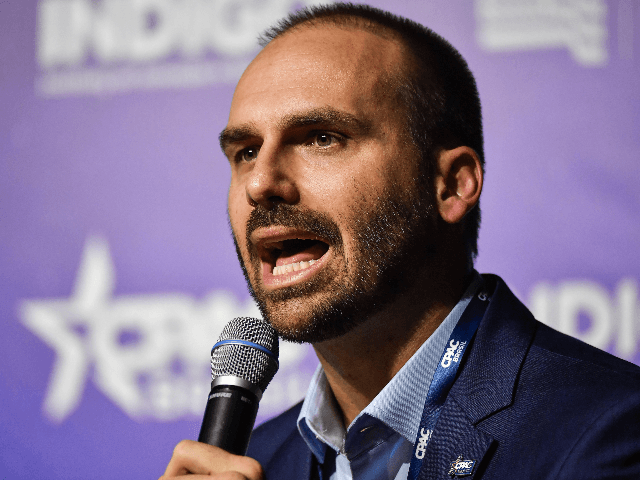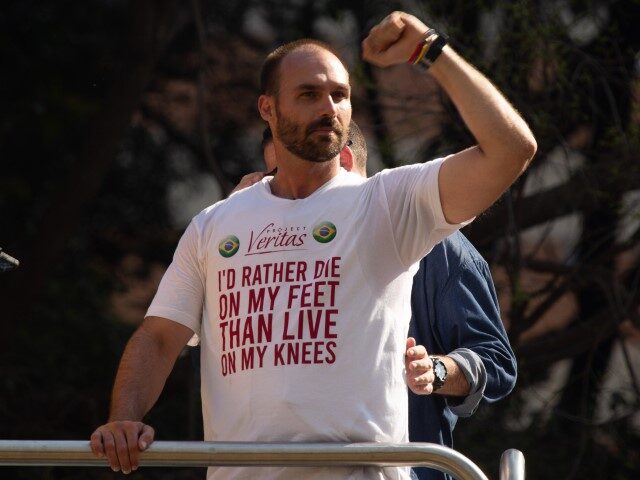More than a dozen Brazilian lawmakers led by Eduardo Bolsonaro, son of former President Jair Bolsonaro and current member of the chamber of deputies, denounced the persecution that opponents of radical leftist President Luiz Inácio Lula da Silva are being subjected to in a Tuesday Congress hearing.
The group of lawmakers, as well as Brazilian journalist Paulo Figueiredo, recounted their personal experiences to Congress, detailing the growing persecution and censorship that the government led by Lula is using to single out opposition members.
The hearing was led by Rep. Chris Smith (R-NJ), Chairman of the House Global Health, Global Human Rights and International Organizations Subcommittee. Rep. Smith stated, “Since late 2022, Brazilians have been subject to human rights violations committed by Brazilian officials on a large scale.”
In his remarks, Eduardo Bolsonaro, who represents Sao Paulo in the Brazilian lower house, denounced the persecution that his father, former Brazilian President Jair Bolsonaro, is being subjected to, claiming that “not even a single word” has been said by the Biden administration with regards to Bolsonaro’s persecution.
“I have always warned in my speeches in [Brazil’s] Congress about dangers of my country turning into a Cuba or Venezuela with their concentration camps,” Eduardo Bolsonaro said. “Today, unfortunately, I live in my own movie about the gulag. My father is now persecuted and slandered in the various ways, and as in any tyranny, the limit of the ridiculous no longer exists.”
“We are living this right now and with not even a single word from the Biden Administration, State Department, or any governmental authority from the homeland of democracy — the United States of America,” he continued. “Brazil, unfortunately, is not a democracy anymore.”
Following his departure from office on December 31, 2022, former President Jair Bolsonaro has faced a long list of indictments and court rulings. The actions against Bolsonaro include, but are not limited to, being banned from running for public office until 2030 and police raids on both his home and that of another of his sons.
🇺🇸Coletiva de imprensa no Capitólio, o congresso mais visto do mundo. As dezenas de deputados que fazem parte deste ato demonstram a sua importância histórica
Não queremos privilégios ou vingança, desejamos apenas resgatar a democracia brasileira à sua normalidade, não mais a… pic.twitter.com/ljCItg7B62
— Eduardo Bolsonaro🇷 (@BolsonaroSP) March 12, 2024
Most recently, Brazil’s Supreme Federal Tribunal (STF) ordered that Bolsonaro hand over his passport to the police, effectively banning him from leaving the country as part of an investigation into a purported “coup” plot that Bolsonaro was allegedly staging after he was narrowly defeated by Lula in the October 2022 election.
The overwhelming majority of the court rulings and open investigations against Jair Bolsonaro have been ordered by STF Minister and “anti-fake news crusader” Alexandre de Moraes. De Moraes is one of Brazil’s most powerful people who, in the past, has led censorship campaigns and police raids against lawmakers, comedians, content creators, and individuals who have expressed support for Bolsonaro. During the 2022 presidential campaign, de Moraes censored Bolsonaro’s campaign, prohibiting it from calling Lula a “thief” or “criminal” in reference to the Brazilian president’s past multiple convictions on corruption charges. The STF overturned Lula’s convictions in 2021 on procedural grounds, which allowed Lula to run for president again in 2022.
De Moraes has also issued court rulings in the past that have forced social media platforms to restrict access to specific profiles within Brazilian territory, lest they pay hefty daily fines. In January, Lula and de Moraes once again made calls for the regulation and censorship of social media in Brazil, claiming that regulations must be approved in the name of “dismantling fake news.”
“We no longer have the privilege of saying the truth, saying what we think, giving our opinion,” Brazilian lawmaker Gustavo Gayer said at the hearing. “All these institutions that are valuable for democracy have been kidnapped and are served as an instrument of oppression. They are served only as to arrest and oppress people for their opinions.”

File/Brazilian Deputy Eduardo Bolsonaro, son of Brazilian President Jair Bolsonaro, speaks during the Conservative Political Action Conference (CPAC), in Sao Paulo, Brazil, on October 11, 2019. (NELSON ALMEIDA/AFP via Getty Images)
“Many other congressmen are not here today because they have had their passports seized,” he added.
In his remarks, Brazilian lawmaker Marcel Van Hatten described Brazil’s situation as a “developing dictatorship” that is different from other dictatorships.
“The one we are seeing in Brazil is built in a more subtle and dangerous way,” Van Hatten said. “The judicial system itself is leading the institutional rupture, which makes it more difficult for the world to understand the sad and dangerous process.”
Brazilian journalist Paulo Figueiredo told Congress how he had been censored by de Moraes and denounced the silencing of journalists in Brazil.
“Until 2022, I was the most-watched political journalist in the country during prime time on cable TV,” Figueiredo said. “Then, overnight, my social media was blocked in Brazil, my Brazilian passport was canceled, and my bank accounts were frozen by order of the Supreme Court justice Alexandre de Moraes.”
The journalist noted that he had “5 million followers across various social media platforms” at the time.
Christian K. Caruzo is a Venezuelan writer and documents life under socialism. You can follow him on Twitter here.

COMMENTS
Please let us know if you're having issues with commenting.